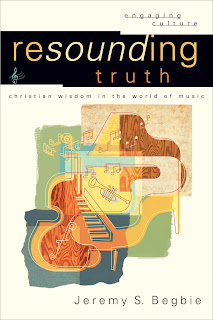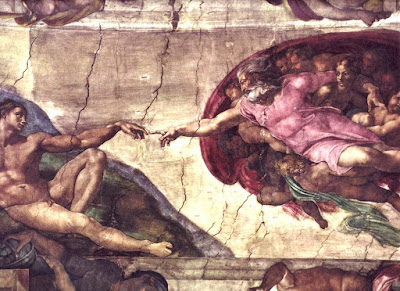I am a musician.
I have never considered how music as an art points to God.
The materials we use to produce sounds (both instruments and vocal chords), the sound waves themselves, our bodies (both in producing sounds and in being able to hear sounds), and even time are all things that already exist, created by God, with which we are allowed to join.
If, by making music, we are tuning in to something that has already been created, perhaps music is able to “elicit something of the character of the cosmos and through that testify to the Creator”. As well as declaring the glory of God, perhaps music (all of the arts, really!) “through the Spirit, (is) capable of granting glimpses of eternal beauty and as such can anticipate and give a foretaste of the transfiguration of the cosmos”, that moment when all of creation will be made perfect.
We should be awe-filled and grateful for the very possibility of music.
It will mean regularly allowing a piece of music to stop us in our tracks and make us grateful that there is a world where music can occur, that there is a reality we call “matter” that oscillates and resonates, that there is sound, that there is rhythm built into the fabric of the world, that there is the miracle of the human body…
None of this had to exist, but it does, for the glory of God and for our flourishing.
As I think about this theology of music, it draws me to the essential habit of gratitude.
Giving thanks is the way into joy. ~ Ann Voskamp in One Thousand Gifts
Paul says in Philippians 4 to not be anxious but rather to give everything to God with thanksgiving and in return, God will give you the gift of peace.
It seems almost ludicrous now, but before reading this book I had never thought through what music can teach us about God. How could I have gone so long without thinking through the implications of this art that I practice? Perhaps this is something that the rest of you have put together long before now, but I am a little slow at times.
I have already, in a previous essay, discussed what music teaches us about the goodness of time, the goodness of delay. Music also teaches us that tension is not bad, that by not trying to skip over days with
dark shadows and turns, we allow ourselves to be led far more profoundly into the story’s sense and power. Music is remarkably instructive here, because more than any other art form, it teaches us how not to rush over tension, how to find joy and fulfillment through a temporal movement that includes struggles, clashes and fractures.
Music gives us a beautiful picture of the Trinity: If I play a chord, three notes on the piano, each note fills up all of my heard space, the entirety of my aural space, yet I hear the notes as distinct from each other.
The notes interpenetrate, occupy the same heard space, but I can hear them as (three) notes…What could be more apt than to speak of the Trinity as a three-note chord, a resonance of life; Father, Son, and Spirit mutually indwelling, without mutual exclusion, and yet without merger, each occupying the same space, ‘sounding through’ one another, yet irreducibly distinct, reciprocally enhancing, and establishing one another as one another?
Music also gives us a beautiful picture of our freedom in Christ: If I play one note on the piano while silently depressing the key an octave above in order to open up the string, the upper string will vibrate even though it has not been struck. The lower string sets off the upper, and the more the lower string sounds, the more the upper string sounds in its distinctiveness. Do you see where this is going?
The more God is involved in our lives, the freer we shall be, liberated to be the distinctive persons we were created to be. And such is the freedom we can share, by virtue of God’s gift of freedom, with others. Simultaneously sounding notes, and the music arising from them, can witness to a form of togetherness in which there is an overlap of spaces out of which come mutual enrichment and enhancement, and a form of togetherness that can be sensed first and foremost as a gift, not as a consequence of individual choices.
Oh, there is so much more I wish I could discuss with you: How music teaches us about how the love of God can be our cantus firmus around which the other melodies of life provide their counterpoint. How it teaches us to read Scripture on many different levels and view our lives as part of a “multileveled hope that covers a huge range of timescales”. How music shows us that delay teaches us something new “of incalculable value that cannot be learned in any other way”.
Ah, but I will restrain. This is becoming too long already.
May I close with a challenge for us as the Church? A challenge for musicians and non-musicians alike?
We seem to have an intense musical conservatism in contemporary worship music.
Granting that simple songs have their place,…one would have hoped that a movement that can put such weight on the Holy Spirit’s renewal could generate somewhat more adventurous material…Is the church prepared to give its musicians room to experiment (and fail), to juxtapose different styles…to resist the tendency to rely on formulas that ‘work’ with minimum effort…in order that congregational worship can become…more true to the God who has given us such abundant potential for developing fresh musical sounds?
Could we, as a church, consider music (as well as all of the arts) as something that can glorify God without having an evangelical message tagged on to it, simply by having artistic excellence?
I would love to hear from artists who practice in other arenas. What theology do you find in your particular art form? What about non-artists? Do you see God in any particular form of art?
I’ll end with one last quote and a poem:
We who have misdirected our praise have been invited, against every expectation and everything we deserve, to step back into that role intended for us, to voice creation’s praise to the resounding glory of the Creator, and to witness wonders beyond imagining in our own lives and the lives of others.
Since I am coming to that holy room,
Where, with thy choir of saints for evermore,
I shall be made thy music; as I come
I tune the instrument here at the door,
And what I must do then, think here before.
~ Hymn to God My God, in My Sickness by John Donne
~ If you are receiving this in your email, may I suggest that you go to the website to better view the videos and hear the music?
~ all quotes, unless otherwise specified, are from Resounding Truth
~ photo credits: Street Musician; Dublin Philharmonic Orchestra





